Papa Don’t Preach
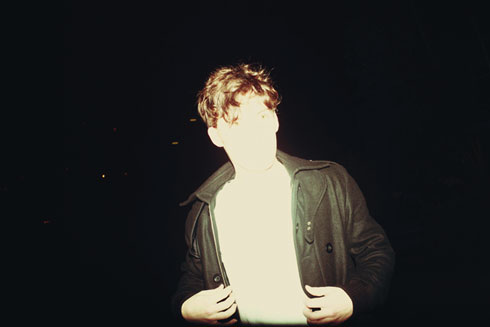
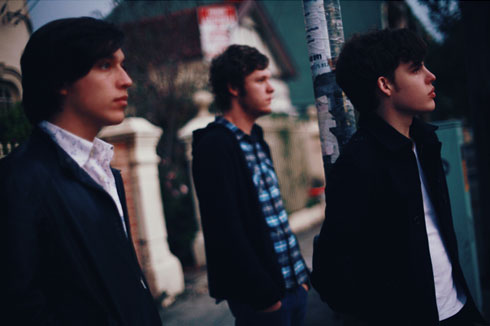
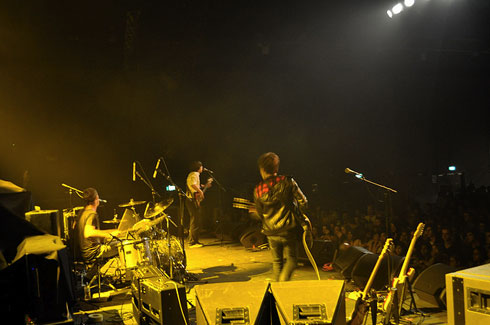
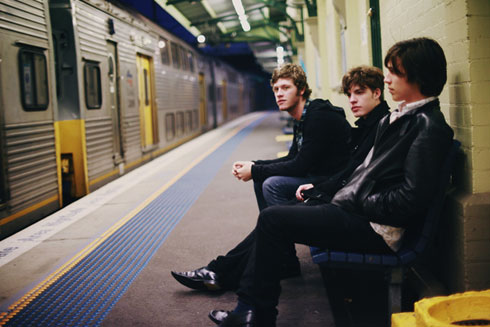
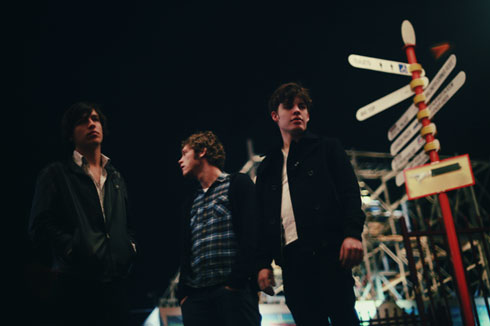
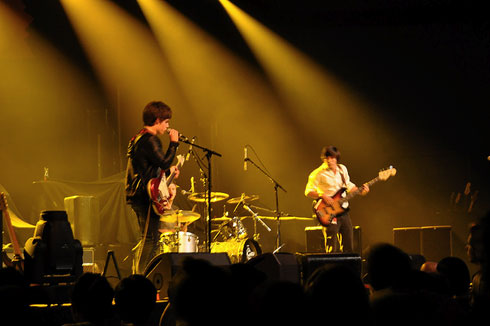
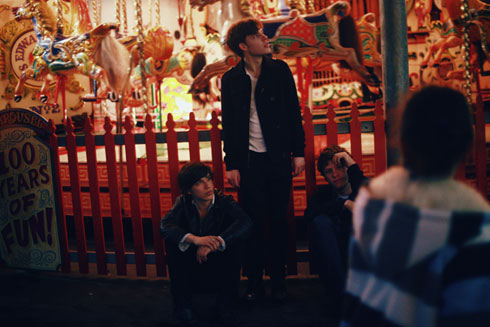
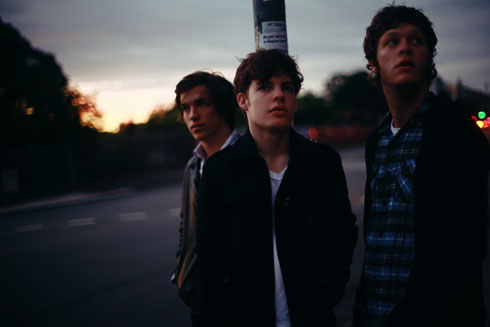
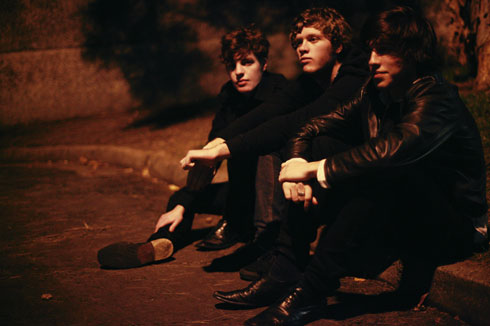
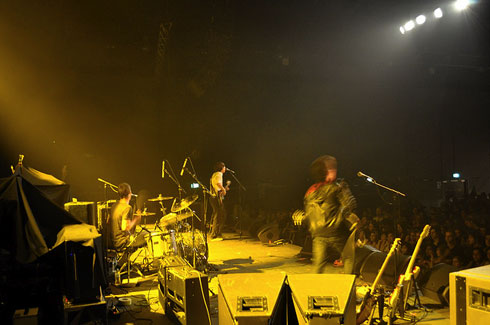 Text: Digby Woods Images: Nirrimi
Text: Digby Woods Images: Nirrimi
At first glance, the name Papa Vs Pretty may be confusing to you. Most band names fall into one of two categories it seems. The first is fairly conventional, non-threatening and easy to understand (even if you don’t understand it). Think of AIR, The Beatles and Interpol. The second category is almost intentionally confusing and cryptic, like it wants to fuck with your mind, just because it can. Think of Godspeed You Black Emperor, Pink Reason and Times New Viking. This latter category is definitely the domain of Papa Vs Pretty and the fit couldn’t be more perfect.
In the competitive arena of the Sydney music scene, gladiatorial battles are common place for spots at The Metro (of course you haven’t seen any battles, they’re invite only. Duh!). However, Papa Vs Pretty have managed to deliver themselves in such a prodigious manner that they’re already doing support acts for the likes of Phoenix, Temper Trap and British India, and have just released their breakthrough EP, Heavy Harm, with EMI’s shiny new sub-label, Peace and Riot. Speaking with Tom Rawle, frontman for the PvsP, we delved into the chestnut of Melbourne vs Sydney crowds, the ambiguous nature of ‘psychedelic’ music, primal breeding and the state of the world. The future for these boys is hardly looking ugly.
Digby Woods: You were just up in Queensland for the launch tour of your third EP, Heavy Harm. How did you find it?
Tom Rawle: Yeah, it was great. I mean, we weren’t playing to a thousand people, we were playing to a couple hundred. It’s not much, but it’s just a matter of getting enough momentum and doing something that’s honest. If you do something that you truly believe in, it might not be as cool as everything else straight up, but if you just persist in it, people start to realise and pay attention, hopefully. If not then I’m fucked (laughs).
DW: As long as you were pleased with the end result, would you care then if only two hundred people ever turned up to your shows?
TR: If I were truly happy with it, I wouldn’t care. To me, I just want to make records that are good enough to make a statement, rather than listening to what everything else is and making something that fits into that because you want to live a particular lifestyle.
DW: How is the Heavy Harm launch going so far?
TR: Well, it’s kind of weird but really good that the EP is getting such a level of publicity, like MySpace are featuring it a lot, which I am eternally grateful for, because we just sent it over to them and they were like, “It’s good, we’ll put it all over our website,” and we were just like, “Fuck, okay, cool.” I mean we’re on most of the pages, you go to the main page with the feature albums, and there’s Arcade Fire and all these bands underneath it, and we’ve got this big banner. It’s weird, it feels wrong (laughs).
DW: You’re local though, and one always promotes local.
TR: I know, which is incredibly great, because not everyone works like that. I mean we’ve gone from like 120, 000 views to something like 194, 000 in a week. I think we’re on rage as well, and Channel V sometimes, which is really weird, but I don’t have pay TV, so I don’t see Channel V anyway.
DW: Is Channel V the one with that girl, whatshername, Fuzzy?
TR: Oh, we saw her walk past in Melbourne I think. I could be wrong, because when you’re on tour you begin to forget which city is which, just because you’re tired and they all have the same things. There are little differences with each place, but really they’re all the same, except for the audiences. Melbourne audiences are fucking awesome and Brisbane as well.
DW: What about Sydney?
TR: Sydney’s good as well, but Sydney always seems to be a little bit more restrained than Melbourne, they just seem to go nuts a little more. People are a little more self-conscious over here. I know when I’m standing in a crowd and everyone’s really quiet, you don’t want to be like “YEEEAHHH!” and jumping around, whereas in Melbourne people don’t seem to care. I remember when we played with Surfer Blood, there were people crowd-surfing and I’d never seen that here before. Like the keyboard-percussionist, Marcus, he just jumped into the crowd and it was the funniest thing I’ve ever seen but also the craziest thing. It’s fantastic to see bands like that because they’re just honest.
DW: Do you guys still work on the side, or are you a full-time band now? Are there any uni constraints for anyone in the band?
TR: Yeah, we still work. Angus (Gardiner – bassist) does some promotions thing with his girlfriend and goes to Sydney Uni. He does philosophy and music, so he’s very, very smart and he does lots of intellectual things. Tom (Myers – drummer), he lives up in the Hunter Valley and comes down here for rehearsals, so he’s so busy. He’s a trooper. I don’t know anyone who spends more time on transport, in transit, than he does. He’s an apprentice winemaker, so whenever we go up to his place we just drink wine, which is pretty good (laughs).
I’m the most boring of the lot, I work at a café on Wednesday and I go to uni at UTS, which is okay, although I’ve been lost in bureaucracy recently, so I attend there, but very confused, I confusingly attend there (laughs).
DW: What are you studying at UTS that has you so tangled in red tape?
TR: I do Communications. I didn’t want to do a music degree just because I suck at theory, and my parents are pretty keen on me getting a degree, so I just try and cram everything in, have that as my last priority.
DW: Yeah, I did Communications and thinking back on it, I can’t remember anything very specific.
TR: It’s helped a little bit, like I understand a bit more about marketing than I used to, and as much as it’s un-indie and un-alternative to care about that, the most well-marketed, image-conscious bands to me are those really alternative, indie bands, where you can see that they’ve really sussed out their stuff on the visual spectrum of things. Even the concept of their music is very straight to the point, and I’d like to get to that point but I’d rather just find it than trying to deliberately structure myself as something obvious.
It feels like it’s getting pretty close, like the [Heavy Harm] EP is more cohesive than the last one and the album is sounding very much like a single voice, it doesn’t sound like all these fucked up things coming from different places. It’s just starting to converge to become one thing, so I can’t wait to do the album, I’ve got it all sussed out in my head, what it’s going to sound like, look like, so I’m really excited for that.
DW: Compared to the three EPs you’ve done, are you preparing for a more intense period of post-production with the album, given expectations?
TR: Well, post-production and doing mixing is not too bad. It’s kind of fun, you get to lounge around and listen to music, just try and get it sounding as immersive as possible, because I just want to make a record that has an ambience in itself. Like Grace, Jeff Buckley’s album, that record as a whole, you just need to put headphones on and it’s like you’re somewhere else. OK Computer or Hail To The Thief, that album in particular, it just has such an atmosphere about and it has its own space. It’s like it somehow managed to jump into your imagination and create this geometric space that wasn’t there before, and this whole entire world just gets laid into your brain.
DW: That’s quite a metaphysical perspective. Looking back, how do you think the band evolved from its early formation with EP1 through to its current stage? What have been some defining points?
TR: The first EP got one review in Drum Media, maybe one in Brag, and I did that all at home and I wasn’t expecting anything really, I just wanted something to give to record labels and booking agencies, and hopefully they’d like us. But the people I was playing with at that point in time left the band because they wanted to share writing credits for the songs. I was pretty young, only 16, and that freaked me out because I’d written those songs before they were in the band, and I’m an extremely anxious and paranoid person, so that freaked the shit out of me and I kind of hit the ceiling for a while.
So we disbanded in that period of time and whatever interest was there was dropped. We didn’t play any gigs and it just got really quiet. Then we did EP 2 when I formed the band again with Gus and Tom, and we get on really well. Heavy Harm was much more of a collaborative effort compared to EP1, which I’d done all by myself.
So yeah, that was a weird point in time, and it’s weird now that Triple J are playing our songs, in a good way though, I’m really thankful that they’re playing [Heavy Harm] because I was really freaking out. Like after we’d finished it I thought, “Fuck, no one’s going to play it, no one’s going to like it.”
DW: Why did you think no one would play it?
TR: I don’t know, like I don’t know how to write songs, it just kind of happens, I can’t really calculate it. I know that at the moment what’s cool is that electro-rock cross-over and really folky stuff, like “Let’s use heaps and heaps of harmony.” I love Grizzly Bear, they do it fantastically, but there are about a million other bands that are trying to sound like Grizzly Bear, and I couldn’t try and sound like anybody. I know I probably do sound like a fuckload of people, but not intentionally. I can’t write songs for a purpose and because of that I know that the songs aren’t exactly what’s trendy at the moment. There’s not that much production to them, they’re just kind of… there. My hope was that the melody would be strong enough, that the actual structure of the songs would be good enough for people to get into them.
DW: Is song writing still solely attributed to you, now that PvsP has become a three-piece?
TR: Yeah, but it’s not a monopoly or anything, that’s just how we work. The process is still very much that I write the songs then take them to Gus and Tom and they flesh them out and make them better. Later down the track once we become a really tight unit, which we’re getting to, then I’d like to start writing some stuff together and see how that goes. But for this EP and for the album the song writing is still very much my domain.
DW: Are there any bands that you strive to emulate in terms of song writing and song structure?
TR: Queens of the Stone Age, they’re a band I really admire, Elliot Smith as well. His songs are incredible, you could play his songs on an acoustic guitar and they’d still retain their awesomeness, whereas like, you couldn’t play Crystal Castles’ new song on an acoustic guitar. Although the singer’s really fucking hot and I love them for that (laughs). I can’t remember, what’s their song at the moment, the new single?
DW: No idea, I haven’t even listened to their new album.
TR: It came out on rage and she looked really hot, so I just kind of bopped along to the song (laughs). If you think of a band like Human League though, who were a completely electronica band in the 80s, songs like ‘Don’t You Want Me?’ and ‘Fascination’, you could play that song on a piano and it would still be a fantastic song, you could play it on anything. The Beatles’ songs are how old? 50 years old or something, and they’ve stood the test of time.
When we played in Melbourne recently, there was this fiddler guy playing on the corner of Flinders St Station, and he was playing the melody from Eleanor Rigby. That melody is so strong that some dude is playing it on a fiddle miles away from where it was originally written, years later, on some random street and people recognise it. That’s a strong song. I’d be so happy if I could write melodies that were that good.
DW: Well, it’s early days for you yet.
TR: (Laughs) I’m not expecting to get to that level at all, but that’s what I admire.
DW: You’ve mentioned Queens of the Stone Age and Jeff Buckley, The Beatles and Elliot Smith. Their musical influence, whether conscious or not, is quite apparent in your songs. However, are there any non-musical influences that have an impact on your music?
TR: Well, a lot of the time I seem to go to parties and I don’t know what to talk about at all, I just kind of sit down and feel awkward. I’ve kind of noticed that at a lot of parties, all these people get together and when they’re not together they watch TV and they come together to talk about what they’ve seen on TV and that’s the talking point, or what they’ve seen on the internet. So they all talk about the same things, drink, get intoxicated, more to the point where it becomes about primal things like fucking and making out and doing that sort of stuff, and it just seems to be this obvious display of primal breeding, but without the actual breeding.
Not that I have a problem with it at all, like I don’t despise it, I don’t disagree with it, I don’t have any negative feelings towards that particular thing, but to me it feels like I know what is going on, and everything that is happening before and during it is just this very shallow masquerade. I usually get really angry or jealous that I’m not taking part in this.
I’m saying I know but I’m probably completely wrong. I just see all this behaviour that looks so devised and I don’t know how to react to it, so I go home and write songs, and then I realise that, oh, that’s a reference to that particular incident and that’s a reference to that particular incident, etc. Like I’m extremely bad at handling situations with the opposite sex, so I’m always writing about failures in that.
DW: That’s the biggest cornerstone of rock music though, or even just art in general, the relationship between love and pain.
TR: It’s interesting because I feel you write the best songs when you’re at your most isolated or lonely. Sometimes I feel it’s almost my job to feel a bit separate and to observe what’s going and take my own thing from it and write about it. I don’t enjoy thinking that way though, that’s why I write to feel better.
It’s not just parties, it’s everything, where everything comes down to fucking and having a family. It seems to me no love is without some kind of game, like this person is with this person because they’re physically attractive and it makes them look more attractive, and this person has money, future prospects, a certain social status, or this person is all I could get. But you can never really know what anybody else is thinking or feeling. Maybe you can but I can’t. I don’t know, everything just seems really obvious but unexplainable, which is very annoying (laughs).
DW: It says on your Wikipedia page that your songs deal with themes of lost love, disenfranchisement, technology, human emotions and the state of the world. Do you agree with this description?
TR: I know that the guy who wrote it, he got all of those points from reviews and interviews that we’ve previously done, so those are all legitimate interpretations of our music, but personally I’ve never thought that much about what I write. Although that’s not to say I don’t identify in some small way. I’ve been in fairly interesting romantic situations as much as anybody, and occasionally I get pissed about how things are like most people, but everybody is affected by similar things.
DW: Being a self-described ‘psychedelic-grunge’ band, do you think the term ‘psychedelic’ has lost some of its meaning in the music world recently due to its constant overuse? What does it mean when applied to Papa Vs Pretty?
TR: I think psychedelic to anyone nowadays is just phaser and reverb and any song that is longer than five minutes, or long hair. But we don’t really have any of those things, Heavy Harm as a record doesn’t even have that much reverb. A lot of my favourite bands don’t use that much reverb, whereas you get bands nowadays like Best Coast where it’s just like reverb everywhere.
I guess when applied to us their was a period where we were doing prog-rock songs that were five to ten minutes in like a billion sections, that could potentially be seen as psychedelic. I wouldn’t say it’s psychedelic though, I don’t even have a phaser pedal. My reverb pedal actually broke the other day, so it’s physically impossible for me to be psychedelic now (laughs).
DW: The cover art of your debut EP is quite surreal, like something out of a Terry Pratchett novel, almost Dali-esque. Who created it and what is the meaning behind it?
TR: This company called We Are Synapse did the artwork and the video clip, which is this animation-type thing. We didn’t know what we wanted for the artwork and our label set us up with them and they’d done some awesome stuff.
Originally I wanted a clay head on the cover that looked kind of real, kind of fucked up, and it would just be sitting there on a bust, but then it seemed a bit too morbid. We got drafts back and it looked more like a Tool album. So I thought, what’s a way we can give it more colour.
Then I looked at this Japanese artist, I can’t remember his name, and he does these heads with all these detailed drawings on them, and I thought it would be cool to have like a 3D-type world in the head with a waterfall coming over the top of it. So I told this to We Are Synapse and they did their own interpretation of it, which took a while to get right, but they have awesome skill with illustration, really detailed. So they did it and we gave it the thumbs up. It was a really smooth process.
DW: It seems about half of all band names are fairly straight-forward and the other half are almost intentionally confusing. Papa Vs Pretty is definitely in the latter category. Are you merely satirising Madonna or is there something deeper at work?
TR: Madonna?
DW: You know, the song, Papa Don’t Preach?
TR: (Laughs) No, no, I didn’t even think about that. When I first started the band there was another guy who sung and wrote lyrics, and I played guitar and wrote the music, so we named the band together. We were in math class and I asked him, “What was your first word?” and he said “Papa”, and then he asked me what mine was, which was “Pretty”, and I can’t remember how it happened but the ‘Vs’ thing got involved because not many bands at the time had ‘Vs.’ in the name. It’s the name that stuck, we didn’t really know what to think about the band name, we were more interested in the music. Now though I think it could be a pretty awful band name, some people think it’s terrible. It’s actually a talking point with some reviews, they’re like, “Terrible band name, good music.” (Laughs)
DW: Have you ever thought about changing the name?
TR: I have but there are bands out there with more ridiculous names that are huge, like Red Hot Chili Peppers and Pearl Jam. It’s a pretty moot point I guess. Some bands have awesome names and all the hipster-type people go, “Fuck yeah, cool band name!” except they have this really ‘abstract’ sound that’s been done by about a billion other people. Whereas if you have this bad band name then you have to really prove yourself with your music.
Papa Vs Pretty
Next story: Twelve Dark Noons – Naked On The Vague



